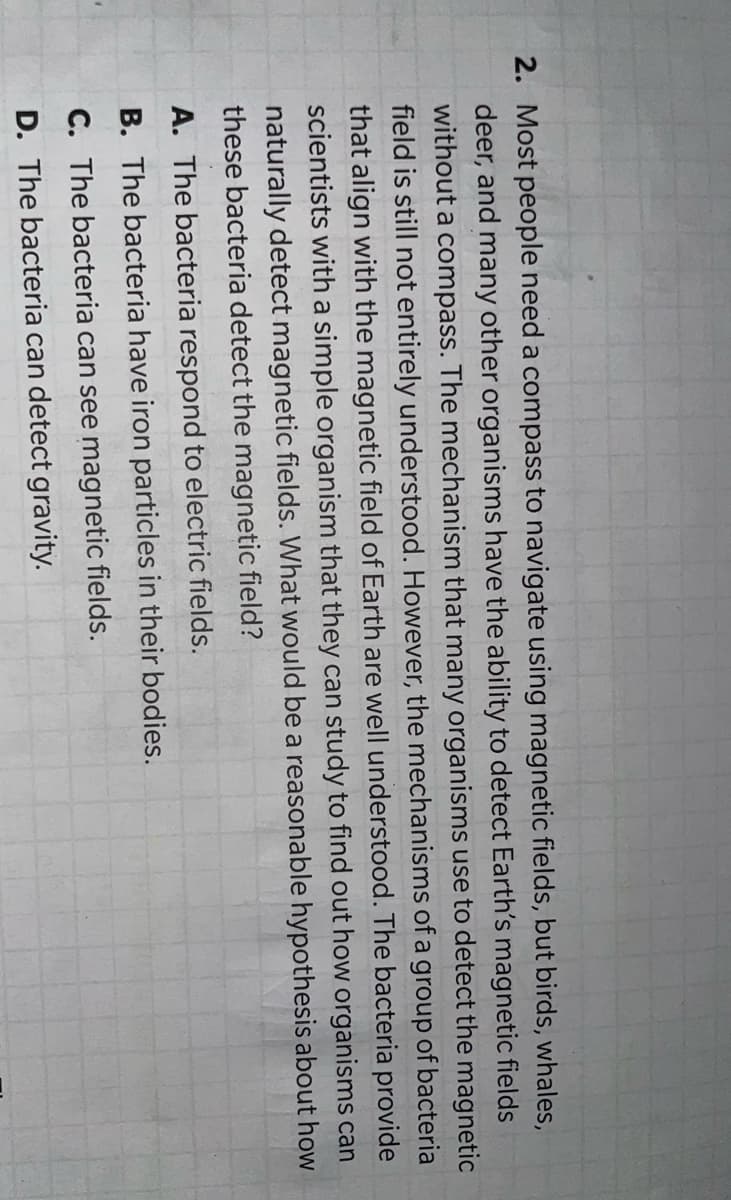2. Most people need a compass to navigate using magnetic fields, but birds, whales, deer, and many other organisms have the ability to detect Earth's magnetic fields without a compass. The mechanism that many organisms use to detect the magnetic field is still not entirely understood. However, the mechanisms of a group of bacteria that align with the magnetic field of Earth are well understood. The bacteria provide scientists with a simple organism that they can study to find out how organisms can naturally detect magnetic fields. What would be a reasonable hypothesis about how these bacteria detect the magnetic field? A. The bacteria respond to electric fields. B. The bacteria have iron particles in their bodies. C. The bacteria can see magnetic fields. D. The bacteria can detect gravity.
2. Most people need a compass to navigate using magnetic fields, but birds, whales, deer, and many other organisms have the ability to detect Earth's magnetic fields without a compass. The mechanism that many organisms use to detect the magnetic field is still not entirely understood. However, the mechanisms of a group of bacteria that align with the magnetic field of Earth are well understood. The bacteria provide scientists with a simple organism that they can study to find out how organisms can naturally detect magnetic fields. What would be a reasonable hypothesis about how these bacteria detect the magnetic field? A. The bacteria respond to electric fields. B. The bacteria have iron particles in their bodies. C. The bacteria can see magnetic fields. D. The bacteria can detect gravity.
Physics for Scientists and Engineers
10th Edition
ISBN:9781337553278
Author:Raymond A. Serway, John W. Jewett
Publisher:Raymond A. Serway, John W. Jewett
Chapter29: Sources Of The Magnetic Field
Section: Chapter Questions
Problem 32AP: Why is the following situation impossible? The magnitude of the Earths magnetic field at either pole...
Related questions
Question

Transcribed Image Text:2. Most people need a compass to navigate using magnetic fields, but birds, whales,
deer, and many other organisms have the ability to detect Earth's magnetic fields
without a compass. The mechanism that many organisms use to detect the magnetic
field is still not entirely understood. However, the mechanisms of a group of bacteria
that align with the magnetic field of Earth are well understood. The bacteria provide
scientists with a simple organism that they can study to find out how organisms can
naturally detect magnetic fields. What would be a reasonable hypothesis about how
these bacteria detect the magnetic field?
A. The bacteria respond to electric fields.
B. The bacteria have iron particles in their bodies.
C. The bacteria can see magnetic fields.
D. The bacteria can detect gravity.
Expert Solution
This question has been solved!
Explore an expertly crafted, step-by-step solution for a thorough understanding of key concepts.
This is a popular solution!
Trending now
This is a popular solution!
Step by step
Solved in 2 steps

Knowledge Booster
Learn more about
Need a deep-dive on the concept behind this application? Look no further. Learn more about this topic, physics and related others by exploring similar questions and additional content below.Recommended textbooks for you

Physics for Scientists and Engineers
Physics
ISBN:
9781337553278
Author:
Raymond A. Serway, John W. Jewett
Publisher:
Cengage Learning

Physics for Scientists and Engineers with Modern …
Physics
ISBN:
9781337553292
Author:
Raymond A. Serway, John W. Jewett
Publisher:
Cengage Learning

Physics for Scientists and Engineers, Technology …
Physics
ISBN:
9781305116399
Author:
Raymond A. Serway, John W. Jewett
Publisher:
Cengage Learning

Physics for Scientists and Engineers
Physics
ISBN:
9781337553278
Author:
Raymond A. Serway, John W. Jewett
Publisher:
Cengage Learning

Physics for Scientists and Engineers with Modern …
Physics
ISBN:
9781337553292
Author:
Raymond A. Serway, John W. Jewett
Publisher:
Cengage Learning

Physics for Scientists and Engineers, Technology …
Physics
ISBN:
9781305116399
Author:
Raymond A. Serway, John W. Jewett
Publisher:
Cengage Learning

College Physics
Physics
ISBN:
9781305952300
Author:
Raymond A. Serway, Chris Vuille
Publisher:
Cengage Learning

College Physics
Physics
ISBN:
9781285737027
Author:
Raymond A. Serway, Chris Vuille
Publisher:
Cengage Learning
